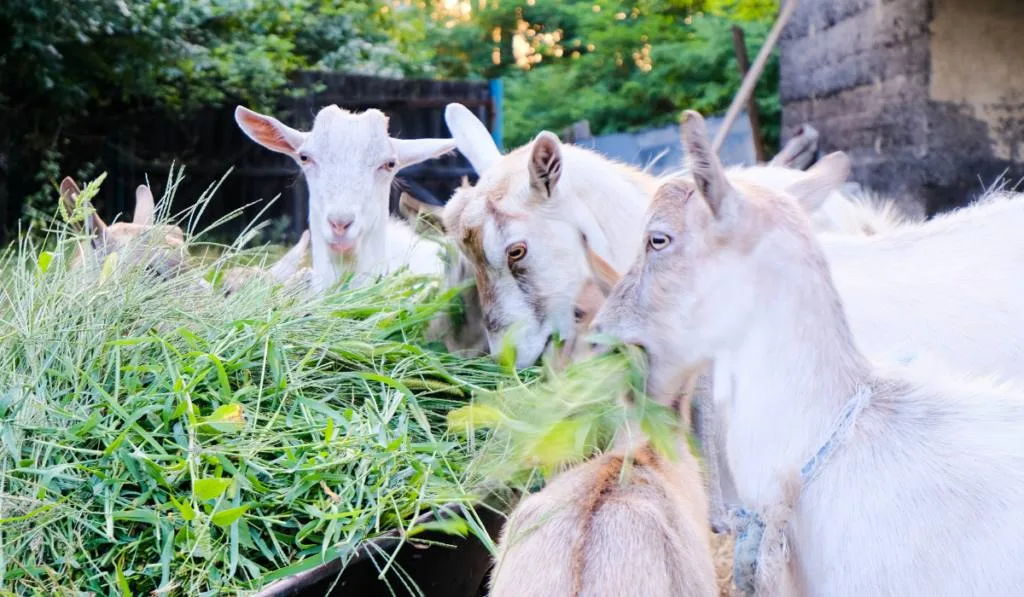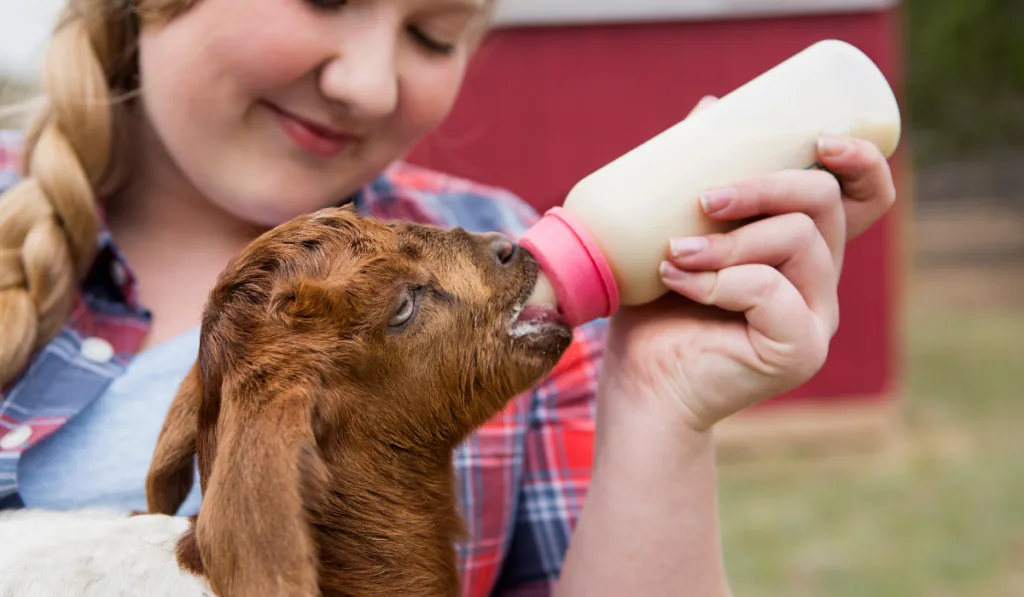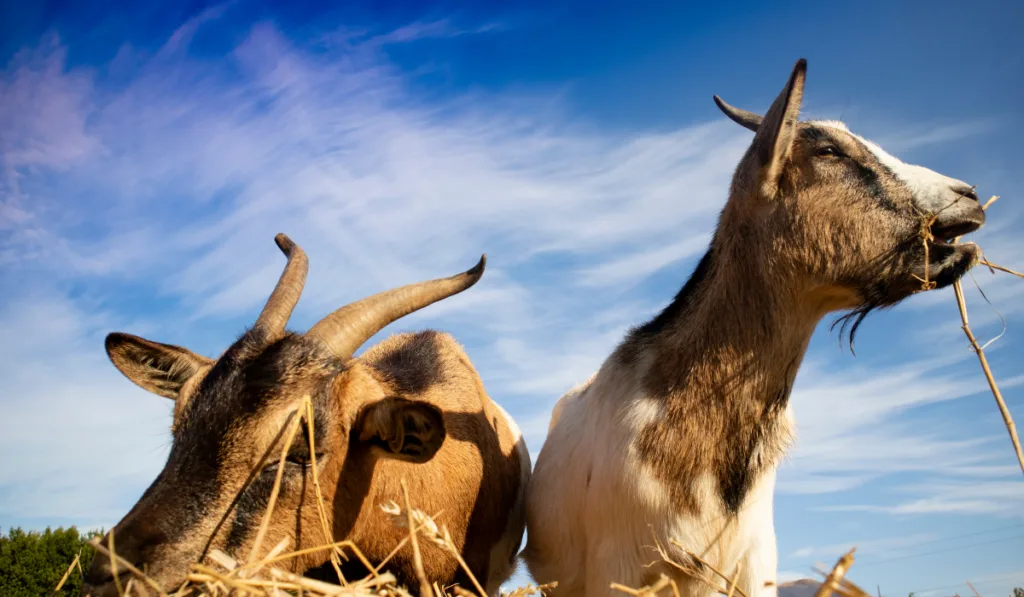In the United States, goat meat is becoming highly popular and it seems the supply of goat meat can’t meet the market demand.
Although highly rewarding, raising goats for meat can be a bit challenging, even to the most experienced farmers.
But with an elaborate understanding of the nutritional needs of goats and enough preparation, even the newest of farmers can raise healthy, happy, and fattened goats.
Table of Contents
Why feed to gain weight?
Goats are high-energy animals, who burn a lot of calories almost at the same rate as they intake them.
Tending to their individual nutritional needs, and finding the right feeds for them to keep gaining weight healthily is a gradual process that takes time to master and requires extra patience, dedication, and energy.
Generally, having the proper nutritional composition and a balanced diet for your goats is the most natural way to keep your goats fattening, alongside improving their health.
Feeding a goat specifically for meat production could, however, get expensive since they require a diverse variety of feeds and nutrients that keeps them fattening and provides quality meat.
For a better insight into what to feed your goat to gain weight, below are a few feeds to consider.

Grass and Forage
Essentially, goats should feed daily on pasture and other vegetation.
Providing ample browsing space for your goats is the most convenient and inexpensive way for you, as a farmer, to provide natural and consistent feeds.
Goats also get all the nutrients they need when they freely browse.
Pasture and other forages like hay and brush are good for your goat’s rumen.
Too much alfalfa should, however, be avoided since when fed with grains, it may lead to a spike in protein levels.
As a goat farmer, it is highly advisable to have adequate pasture and browsing space where the goats will have a variety of feeds and leaves for their diet.
You can, however, feed them grains if your area has no grazing space.
Vitamins
Though required in small quantities, vitamins are essential for a goat.
The vitamins most likely to be deficient in their diet are Vitamins A and D.
Vitamin C on the other hand is synthesized in the body tissues in adequate quantities that meet the dietetic needs of the goat.
Although considered dietetically inessential, vitamins B and K are produced by the bacteria found in the rumen.
Vitamin A is not naturally found in forages but is rather synthesized in the body from carotene found in the green, leafy forage, and is stored in the liver and fats whenever there is a surplus intake as compared to the requirements.
For goats being fed forage that has been stored for a long time or weathered forage, they should be given vitamin A injections or fed a mineral mix that has vitamin A.
Long-term confinement of livestock, including goats, in a barn, may lead to deficiencies in Vitamin D.
While high-quality sun-cured hays are be a good source of vitamin D for them, frequent exposure to sunlight is the best option for the natural synthesis of vitamin D beneath the skin.
If you cannot give them sun-cured hays or exposure to sunlight, they should be given a vitamin D supplement.
In livestock, deficiencies in vitamin D could lead to poor calcium absorption and intake which, in turn, could lead to rickets, often characterized by poor and abnormal bone and joint formation.

Grain
Grains such as corn and oats are the easiest and quickest way to help your goat to gain weight because they have a high carbohydrate amount.
Experts, however, say that goats should not eat more than 1 ½ pounds of grains per day. For beginners, start with a quarter a pound a day then you can gradually increase the uptake of the grains.
These grains also have proteins that aid in bodybuilding (muscle), and digestion, allowing better and improved absorption of nutrients.
Grain diets should not be more than 10% of the feeds to avoid constipation and poor health.
Furthermore, most grains have high levels of phosphorus and are low in calcium.
Proteins
Just like in humans, proteins help goats build body muscles and aid in carbohydrate digestion.
Protein deficiency in goats could lead to too quick and rather incomplete digestion of carbohydrates causing decreased energy and poor mineral absorption.
For meat goats, 7% crude protein is the required minimum.
Anything below that could lead to a decrease in forage consumption, which eventually leads to weight loss.
Oats and corn, among other grains, have high levels of protein and energy essential for weight gain in goats.
Give the Goats a Vitamin and Mineral Supplement
Vitamin and mineral supplements given to the goat all depend on the amount of carbohydrates, fat, and proteins you feed your goat.
These supplements are easily available and acquired over the counter at most feed stores.
Calcium is perhaps the most popular mineral, but you should provide your goat(s) with vitamin and mineral supplements that also include phosphorus, selenium, magnesium, iron, iodine, manganese, zinc, and copper.
These supplements could be added to the grains or given as a free choice in a mineral block.
Mineral blocks should however be avoided because they are saturated with salt.
Too much grain may also lead to constipation and other health issues.
For convenience, pelleted supplements are encouraged since they can easily be blended and mixed in regular feeds and grains during regular feeding.

Water Your Goats
As a responsible farmer, you should always ensure that clean, and fresh water is always easily and readily available to your goats.
Although most goats get all their water needs from lush grasses and rain-soaked foliage, it is always important to consider having water around and available, just in case they need it, as in the case of pregnant and lactating does.
If you do not have a lake or a pond nearby for your goats to access water, investing in a trough is a wise decision.
Tips for Feeding Goats
- Before feeding them, check their health conditions to understand and better feed them.
- Uphold hygiene when feeding goats.
- Safely store feeds to keep their feed value intact.
- Maximize and only feed them high-quality forage.
- Ensure your goats have adequate vitamins and green feeds for better minerals in their feeds.
- Ensure baby goats receive enough colostrum.
- Gradually change the feeding habits, if you must, rather than changing things suddenly.
Conclusion
Weight gain for goats is easily achievable, as long as a well-constituted nutritional and balanced diet is given to the goat.
If possible, goats should always be left to roam around while eating pasture and browsing for leaves in free spaces.
Goats are never picky about their food, always curious, and will chew on almost anything that comes along their sight.
Kitchen scraps can be good for them, including banana peels, tomato, orange peels, garlic skins, and other fruit and vegetable cuttings.
You should, however, be careful not to let your goat be in contact with any paper, as it is toxic to them.
Any processed food, including dog and cat food, should be kept away from goats to avoid exposure to health risks when they eat them.
Resources
- https://www.boergoatprofitsguide.com/what-do-you-feed-a-goat/
- https://animals.mom.com/how-to-fatten-a-goat-for-the-butcher-12582353.html
- https://s3.wp.wsu.edu/uploads/sites/2051/2014/02/marketgoatguide1.pdf?
- https://www.bentoli.com/goat-supplements-improve-health/
- https://content.ces.ncsu.edu/nutritional-feeding-management-of-meat-goats
- https://www.agriculture.com/livestock/what-to-feed-goats_275-ar41207
